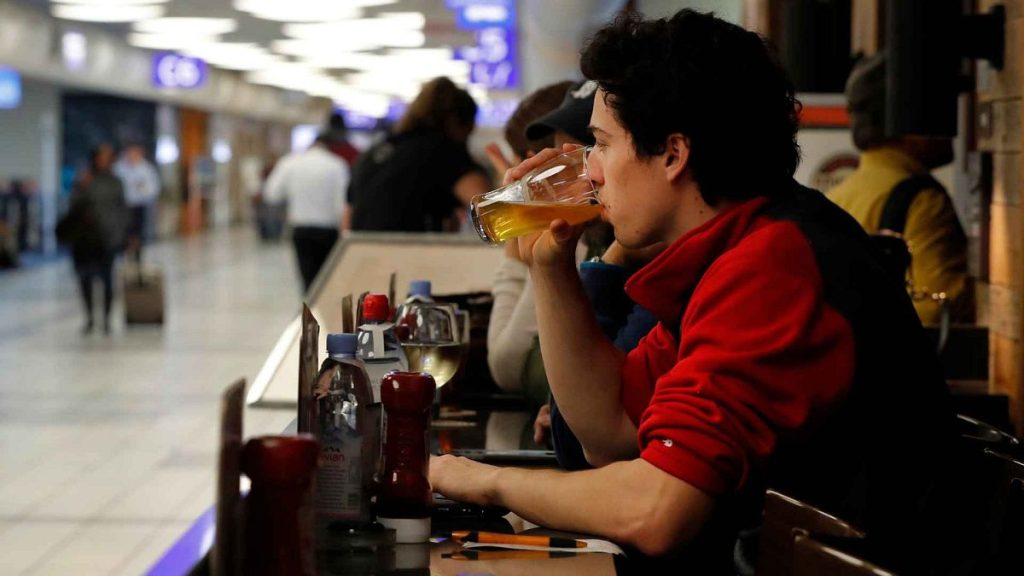Ryanair, the prominent European budget airline, has issued a strong call for stricter regulations on alcohol consumption at airports, advocating for a two-drink limit per passenger prior to boarding. This initiative stems from the airline’s growing concern over disruptive behavior on flights, often fueled by excessive alcohol intake. The airline argues that such a restriction, implemented through the use of boarding passes similar to duty-free purchase limits, would significantly enhance passenger and crew safety, fostering a more pleasant and secure travel environment. This call to action coincides with Ryanair’s legal pursuit of a passenger for €15,000 in damages related to a flight diversion caused by their disruptive behavior.
The incident, which occurred in April 2024 on a flight from Dublin to Lanzarote, involved a passenger whose actions were deemed so disruptive that the aircraft was forced to divert to Porto, Portugal. The unscheduled landing resulted in considerable expense for Ryanair, including overnight accommodation for over 160 passengers and six crew members, along with the associated costs of meals, airport fees, replacement crew, legal fees, additional fuel, and lost in-flight sales. The airline highlights the financial burden such incidents place on carriers and stresses the need for preventive measures to curb alcohol-related disturbances. Ryanair underscores that while it already limits alcohol sales during flights, passengers often pre-load at airport bars, particularly during flight delays, where no such restrictions are currently in place.
The airline’s concern resonates with aviation agencies worldwide, who have expressed growing alarm over the escalating number and severity of disruptive incidents on flights. These incidents often involve violence against fellow passengers or crew, verbal abuse, harassment, and other health hazards such as smoking. The financial implications of diverting a flight due to unruly passenger behavior are substantial. In Ryanair’s specific case, the costs accrued quickly, totaling €15,000. The largest expense, €7,000, covered the overnight accommodation and meals for stranded passengers and crew. Further expenses included airport landing and handling fees (€2,500), replacement crew costs (€1,800), legal fees in Portugal (€2,500), excess fuel consumption (€800), and lost revenue from in-flight sales (€750).
This breakdown highlights the cascading financial repercussions of disruptive incidents, impacting not only the airline’s bottom line but also disrupting the travel plans and incurring unexpected costs for hundreds of passengers. Ryanair’s detailed account of these expenses serves as a stark illustration of the tangible consequences of unruly passenger behavior. This case, although extreme, underscores the broader trend of increasing disruptive incidents in the aviation industry. While such occurrences remain relatively rare, their frequency has been on the rise, prompting concerns from both airlines and aviation safety agencies.
The European Union Aviation Safety Agency (EASA) has observed a marked increase in both the number and severity of these incidents since 2020. Globally, the International Air Transport Association (IATA) reported one disruptive incident for every 480 flights in 2023, a noticeable increase from one every 568 flights in 2022. This data, based on reports from over 24,500 flights and 50 operators worldwide, paints a concerning picture of increasing unruly passenger behavior. While the exact proportion of incidents directly linked to alcohol consumption remains unclear, it is widely recognized as a significant contributing factor.
In response, aviation organizations, including IATA, are emphasizing the responsible serving of alcohol, preventing intoxicated passengers from boarding, and implementing various safety initiatives to address disruptive behavior. Programs like the “One Too Many” campaign in the UK aim to raise awareness about the consequences of excessive alcohol consumption and promote responsible travel behavior. In the United States, the Federal Aviation Administration (FAA) reported over 2,100 unruly passenger incidents in 2023, leading to substantial fines. While this figure is slightly higher than the previous year, it remains significantly lower than the peak observed in 2021. The collective efforts of airlines, regulatory bodies, and awareness campaigns aim to mitigate the risks associated with unruly passengers and create a safer and more enjoyable travel experience for everyone.














